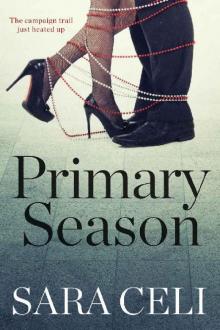#SoBasic Read online
#SoBasic
The Misadventures of a Modern Woman
Copyright 2018 by Sara Celi
Published by Lowe Interactive Media, LLC
All rights reserved.
Without limiting the rights under copyright reserved above, no part of this publication may be reproduced, stored in or introduced into a retrieval system, or transmitted, in any form, or by any means (electronic, mechanical, photocopying, recording, or otherwise) without the prior written permission of both the copyright owner and the above publisher of this book.
This is a work of fiction. Names, characters, places, brands, media, and incidents are either the product of the author’s imagination or are used fictitiously. The author acknowledges the trademarked status and trademark owners of various products, bands, and/or restaurants referenced in this work of fiction, which have been used without permission. The publication/use of these trademarks is not authorized, associated with, or sponsored by the trademark owners.
License Notes
This ebook is licensed for your personal enjoyment only. This ebook may not be re-sold or given away to other people. If you would like to share this book with another person, please purchase an additional copy for each recipient. If you’re reading this book and did not purchase it, or it was not purchased for your use only, then please return to your favorite ebook retailer and purchase your own copy. Thank you for respecting the hard work of this author.
For T—A woman who is so much more than basic
Table of Contents
Title Page
Chapter One
Chapter Two
Chapter Three
Chapter Four
Chapter Five
Chapter Six
Chapter Seven
Chapter Eight
Chapter Nine
Chapter Ten
Chapter Eleven
Chapter Twelve
Chapter Thirteen
Chapter Fourteen
Chapter Fifteen
Chapter Sixteen
Chapter Seventeen
Acknowledgements
Other Books by Sara Celi
Coffee. I needed one thing and one thing only—a steaming cup of liquid goodness to start off my week. Without it, I wasn’t sure I’d make it through the next five days at WCIN. I wasn’t a morning person, and coffee spiced up the brain fog I often felt before noon. I rounded the corner and slid into the break room, desperate for a cup. And then I saw her.
Lisa.
I stopped short. She stood at the machine, probably waiting to pour herself a large helping of brew. Pain grew in the deepest pit of my stomach.
Oh, God. Not this. Not her.
What a way to start a Monday. Just minutes through the door, without even a glance at my work email, and I had to run into her. Lisa, our executive producer. Lisa, who didn’t like me. And Lisa, who I was almost sure wanted me fired.
“So, um—how are you? Did you spend some time with the kids this weekend?”
She raised an eyebrow then shook her head. “Wayne had them all weekend, so I was alone in the apartment. He and his new wife took them to Chicago.”
Lisa said the word “Chicago” as if it was a synonym for the first circle of hell.
“Oh,” I replied, and if I could have kicked myself, I would have. Lisa’s divorce had legendary status around the office—largely because it involved a cheating husband and a nasty alimony battle. Everyone knew not to bring it up, and here I had done so after literally a ten-second interaction. Big mistake. “I’m sorry. That … that sounds sad.”
The reply was a feeble attempt to release some of the pressure that had instantly built in the room.
“It was. It was very sad.” She tossed me a fake smile and replaced the pot on the burner. “At least they had fun. But they always do.” She sneered. “Thanks to Julie.”
Okay, then …
I took a hesitant step toward the coffeemaker, picked up the pot, and poured my own cup of fresh brew. Better to change the subject. “Um … what kind of coffee are we having today? It smells good.”
Lisa pointed to a round, green can that I hadn’t noticed before, one with large block writing that said the grounds came from Guatemala. It looked like a product from a fair-trade cooperative. “I found this at the grocery store last week, and I thought it would be nice to share with the news team.”
I picked up the canister and examined the label. “Guatemalan coffee? Interesting.”
“Interesting?” Lisa’s reply came loaded with warning. “You say that like you know you’re going to hate it.” She sighed. “They happen to make some of the best coffee in the world.”
I put down the coffee beans. “I had no idea. I usually just drink the normal kind.”
“The normal kind? Are you saying Guatemalan coffee isn’t normal?”
Stop talking, Margot. Stop. Now. Just stop.
“No, I—”
“Coffee from this country is usually a dark roast, full-bodied and velvety. It’s very good. True coffee drinkers know that. And the bag I brought today is from my favorite roaster. His technique from the Mayans has been handed down for centuries.”
“Mayan? Aren’t they extinct?”
“Excuse me?”
“Well, I mean … I thought they died off, and—”
“Where did you learn that? Western Civ one oh one? But then again, I’m surprised you passed that class.”
“I just—”
Her tone of voice had shifted, and I knew I wasn’t only on shaky, crumbling ground. I was slipping off the cliff …
Shit.
“It sounds like good coffee.” I gulped. “Just never tried it.”
“No time like the present, and”—Lisa waved me away as she moved toward the sugar and creamer station adjacent to the coffeemaker. She dumped hazelnut half and half into her cup then followed it with two sugars. “Forget it. Moving on. The Ohio Senate votes today on the budget bill, so we should book Senator Graham for an on-set interview in the five. Can you make that call, please?”
“Of course,” I said as I moved to the cream and sugar station. Then I reached for the stirrers and knocked them over. “Oh, God, I’m sorry.”
I grabbed them then shoved what I could in the holder as I felt blood drain from my cheeks. If this train wreck of a conversation lasted any longer, I might pass out. “You … um … you were saying you wanted me to make a call?”
She regarded me for a moment. She had the upper hand, and we both knew it. “We had the senator on the morning show Friday, and his people said he’s available this afternoon if we want him.”
“Fantastic.”
Lisa regarded me. “I’m sure you have his contact information.”
“Absolutely. It’s programed into my phone.”
I couldn’t have cared less about a person like Senator Graham, or a vote like that. In fact, I wasn’t sure I knew his first name. Politics were so boring—and state politics even more so. A bunch of talking heads arguing about budgets and taxes. No faster way to kill ratings for a newscast, but I knew Lisa wouldn’t listen to my suggestions for a different guest. She oversaw all WCIN’s afternoon shows, while I spent my time posting articles to the website and begging reporters for social media content.
“I’ll call his communications director this morning.”
Lisa gave me a tight smile, tossed her empty creamer packet in the trash, and left me alone in the break room. Only then did I allow myself to really exhale.
Monday could finally begin.
The email landed in my inbox as I wrote last-minute teases the five o’clock newscast. It had a simple subject line: My office, please.
I took a deep breath and opened the message. This email could
go one of two ways.
Margot,
After the 5:00 newscast and the post-show meeting, let’s meet in my office for a few moments. We need to have a quick but important chat.
Thank you,
Scott Hawthorne
News Director, WCIN
I swallowed. Within the last nanosecond, my throat had gone drier than Death Valley. I hated getting meeting requests from him, especially ones directed specifically to me. My whole goal was to stay out of Scott’s office at any cost. Staying out of any news director’s office meant I was doing my job, and that was exactly what I wanted.
And something about this recent email seemed off.
But perhaps I was overthinking this. I scanned through my interactions with him and the rest of the staff over the last week, then the prior two weeks, and finally the last month. Nothing stood out to me, so I had no clue what he’d want to discuss.
It isn’t anything too serious, Margot. Don’t overreact.
Maybe he wanted to talk about my Instagram handle, @socialkitten. In the last six months, I’d grown that account to over 14,000 followers, and I’d done it by posting strategic photos all centered around a bright, cheerful theme. Scott might want some ideas on who could do the same thing for WCIN’s account that stood at an anemic 975 followers.
Yes, that’s probably it.
I closed my email and returned to my most immediate task—creating a series of teaser tweets on social media that promoted our upcoming shows. They needed to post every fifteen minutes, and each required a few lines of snappy content to get viewers interested. I had just written the second one and needed to begin the third.
At least I had this mindless chore to distract me.
“Margot,” Scott said when I darkened his door, “thanks for coming in.”
“Anytime,” I replied, eager to get to the point of the conversation. “Is this about @socialkitten, because I don’t know if you’ve seen what I am doing with it, but I have some ideas—”
“Sit down, Margot.”
He motioned for me to sit in one of the two chairs in front of his wide, L-shaped desk. I chose the one without a stack of papers and binders on it. Scott wasn’t the neatest or the most efficient person, and his office reflected that. It was a mess of old tapes, piles of papers, newsroom swag, awards, and broken equipment, all alongside a row of six TVs on the far wall, each turned to various news networks and live feeds. His office overlooked the main newsroom, and from there he had a view of the two dozen or so cubicles and workstations that made up the nucleus of WCIN’s newsgathering operation.
“First, the show teasers on Facebook for today looked very good,” he said. “Thanks for that.” I smiled, good news. He liked something I had done—what a relief. Better still, he knew I’d posted them. Yes.
But then Scott got up and closed the door.
I cringed. Closed-door meetings with Scott Hawthorne almost never meant something positive. Many times, people left in tears after one of those meetings.
“I’m glad you liked the posts.” I gulped, willing my tongue to stop thickening in my mouth. No such luck.. “I’ve asked the reporters to try being a little bit more active in their videos—showing at least one thing, holding a prop, pointing at something, movement—anything to keep the attention of the viewer for the length of the video.”
“And they’ve agreed to it?”
“So far.”
“Hmm. Interesting.” He sat down in his desk chair, folded his hands, and studied me. “I’m curious, what kind of experience would you say you’ve had here at WCIN, Margot?”
I shrugged and noticed how my armpits began to prickle with sweat. “A good one. Challenging. Fulfilling.”
What other response would I give him? Nothing he’d deem acceptable. He might have been my boss, but he’d made it clear from my first day of employment he didn’t like complaints and grumblings from the staff. During my first week alone, two staffers left editorial meetings sobbing.
Scott Hawthorne was “that” kind of boss.
I knew better than to tell him the truth about the daily frustrations I encountered, like reporters who failed to do social media teases, or Janet, the other web producer, who was always half asleep and made bitchy comments whenever I wanted to make editorial or grammatical changes to the website.
No, I couldn’t tell him about those things.
Scott wouldn’t understand, even if he had tried to listen. The man came to WCIN after five years as an executive producer in Miami on the number-one newscast in that city. His agenda in Cincinnati meant he stayed focused only on driving up the ratings so SunCom, the station’s parent company, would give him a promotion to one of our better stations, like maybe KLAC in Los Angeles. Scott didn’t want to hear about the small injustices I experienced every day while working in the bullpen he ran.
“I’ve learned a lot here, and I’ve been really thankful for the opportunity.” I hoped this sounded honest and earnest. “It’s been very different than WKYM.”
“Wonderful.” Scott clicked his teeth. “I’m glad. That’s how it should be for each of my employees. Life should be about personal growth.”
“I believe that too.”
He cocked his head. “You do?”
I nodded. “That’s why I’m here. I want to learn to be a better producer. A great producer.”
This mantra had helped me get through grueling days, extra shifts, and a job that had never allowed me a normal social schedule. No matter how disappointing the industry might have been, I had decided that I wanted to be a great TV producer, and by God, I was going to get there. Nothing would stop me.
“You’re not here because we’re a bigger market?” Scott paused. “I’m sure we pay more than WKYM, as well. I forget—what’s the going rate for a producer there? Twenty-five thousand a year?”
“Twenty-one before taxes.” I bit back the memory of what life had been like not so long before, when I’d worked sixty hours a week for wages that didn’t pay my bills. WKYM had been my first job after college, and it was a small station in the middle of eastern Kentucky that barely registered as its own news market. “Gotta start somewhere, though.”
“That’s right, Margot.”
Someone knocked on his office door. Scott excused himself, got up from the chair, and opened it. Marsha Keen, WCIN’s director of HR, walked into the room with a tight smile on her face that gave away nothing. She carried a stack of white papers, had a pen tucked behind her ear, and she sat in the chair opposite me.
Scott resumed his place at his desk. “I asked Marsha to be a part of this discussion, so I could make sure that what we are about to talk about is done in a fair and proper manner.”
His voice had turned so deep and serious. Oh, god. I searched his face for something that would give away what was about to happen next. And to my relief, it seemed a hint of a smile pulled at his lips. I moved to the edge of my chair.
Maybe, just maybe, this was it.
Maybe this was the moment. The conversation I’d waited for since my first day at WCIN—the conversation about my promotion. And maybe Scott would give me the five o’clock show full-time—no more substituting.
I knew it. I knew it …
I stopped breathing. I wanted this moment to last.
Scott cleared his throat. “I normally don’t like to do this on Mondays, but in this case, we have no choice.” He paused. “I’m just going to frank. Margot, as of today, you are no longer an employee of WCIN or of SunCom National Media.”
“What?” With my eyebrows raised, I leaned forward from the momentum of giddiness I thought I was going to experience, which had suddenly and irretrievably vanished. My heart dropped into my stomach and blood coursed through my body in a warm flash. “What did you say?”
“We are terminating your employment.”
“Excuse me?” My eyebrows were still raised, as if I couldn’t quite make out what he had said.
Clearly, he misspoke.
“
You’re fired.”
Blink. Blink. Blink. I sat against the back of the seat.
Oh, no.
He hadn’t made a mistake. He didn’t sound like he was joking, either. The words could have been two large punches straight to the middle of my gut. “I’m fired?”
Scott nodded but kept his expression unreadable. “As you know, we received some complaints last month from viewers about some cultural insensitivities regarding the recent newscast you produced during Brian’s vacation. Those grievances focused specifically on the voter registration stories that you ran in the b-block of your show on March tenth.”
“But we addressed those in a private meeting.” I frowned, remembering how he’d promised he wouldn’t hold that blunder against me in the future. “It was an honest mistake in wording, and I didn’t mean to”—I gulped— “I thought this was dealt with already, and in the past.”
“It was.” Scott glanced at Marsha, and I followed his lead. She still wore a stony, poker-faced expression that made the natural lines on her face seem deeper and more pronounced. “But this afternoon, shortly before lunch, we received a message from an anonymous employee who said she felt that you were being unnaturally aggressive and culturally insensitive to her and some of the causes that she celebrates.”
“What?” I couldn’t stop the question from leaving my mouth. “What are you talking about? Unnaturally aggressive?”
“That’s our assessment, based on the facts.”
“What facts?”
“The ones we have gathered this afternoon.” Scott motioned to Marsha, who flipped through some of her paperwork, as if everything happening in this room had been orchestrated before I’d arrived. “As you know, SunCom instituted a no-tolerance policy earlier this year concerning micro-aggressions and cultural insensitivities in the workplace. Very serious stuff.”
“I remember that staff meeting, but—”
Scott held up a hand. “The employee who made the complaint felt upset and threatened by your flip response.”
“And that’s a firing offense?”

 #SoBasic
#SoBasic Vote for Love: The Box Set (Vote for Love )
Vote for Love: The Box Set (Vote for Love ) Christmas In Watch Hill : A Small Town Holiday Duet
Christmas In Watch Hill : A Small Town Holiday Duet Grateful in Watch Hill : A Small Town Romance
Grateful in Watch Hill : A Small Town Romance Acquiring Ainsley
Acquiring Ainsley Lusting For Luke_A Billionaires of Palm Beach Story
Lusting For Luke_A Billionaires of Palm Beach Story Primary Season
Primary Season Acquiring Ainsley_A Billionaires of Palm Beach Story
Acquiring Ainsley_A Billionaires of Palm Beach Story Hollywood Nights
Hollywood Nights